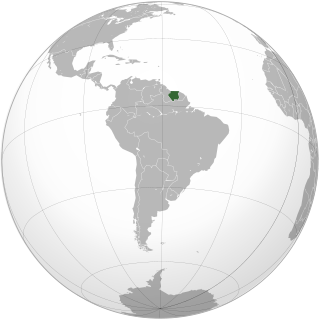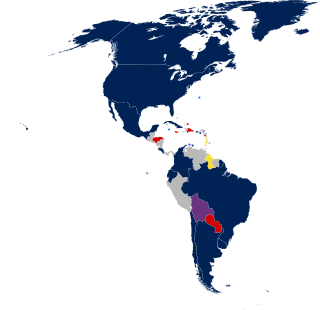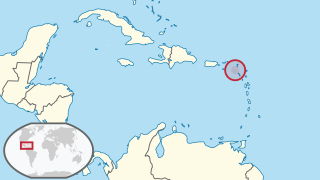Same-sex marriage has been legal in the Netherlands since 1 April 2001. A bill for the legalisation of same-sex marriage was passed in the House of Representatives by 109 votes to 33 on 12 September 2000 and by the Senate by 49 votes to 26 on 19 December 2000. The law received royal assent by Queen Beatrix of the Netherlands on 21 December 2000 and took effect on 1 April 2001. The Netherlands was the first country in the world to legalize same-sex marriage. Polling suggests that a significant majority of Dutch people support the legal recognition of same-sex marriage.
Same-sex marriage is legal in Aruba and Curaçao, which are constituent countries of the Kingdom of the Netherlands. The islands are obliged to conduct same-sex marriages following a ruling from the Supreme Court of the Netherlands on 12 July 2024. In September 2021, a lower court in Curaçao ruled that preventing same-sex couples from marrying violates the equality provisions of the Constitution of Curaçao, but left the decision of whether to legalise same-sex marriage up to the Parliament of Curaçao. In December 2022, the Joint Court of Justice of Aruba, Curaçao, Sint Maarten, and of Bonaire, Sint Eustatius and Saba ruled on appeal that Aruba's and Curaçao's same-sex marriage bans were unconstitutional. The court order was set to go into effect on 7 March 2023 if not appealed to the Supreme Court; however, the governments of both Curaçao and Aruba subsequently appealed. On 12 July 2024, the Supreme Court upheld the lower court ruling, effectively legalizing same-sex marriage in Aruba and Curaçao with immediate effect.

The Supreme Court of the Netherlands, officially the High Council of the Netherlands, is the final court of appeal in civil, criminal and tax cases in the Netherlands, including Curaçao, Sint Maarten and Aruba. The Court was established on 1 October 1838 and is located in The Hague.

Lesbian, gay, bisexual, and transgender (LGBT) people in Suriname may face legal challenges not experienced by non-LGBTQ residents. Both male and female expressions of same-sex sexual activity are legal in Suriname. Since 2015, hate speech and discrimination in employment and the provision of goods and services on the basis of sexual orientation has been banned in the country. Same-sex marriage and civil unions are not recognised by law. Nevertheless, Suriname is legally bound to the January 2018 Inter-American Court of Human Rights ruling, which held that same-sex marriage is a human right protected by the American Convention on Human Rights.

Lesbian, gay, bisexual, and transgender (LGBTQ) rights in the Netherlands are among the most advanced in the world. Same-sex sexual activity was legalized in 1811 after France invaded the country and installed the Napoleonic Code, erasing any remaining sodomy laws. No more sodomy laws were enacted after the country received independence. An age of consent equal with that of heterosexual activity was put in place in 1971. During the late 20th century, awareness surrounding homosexuality grew and society became more tolerant of gay and bisexual people. The changes eventually led to homosexuality's declassification as a mental illness in 1973 and a ban on discrimination based on sexual orientation in the military. The Equal Treatment Act 1994 bans discrimination on account of sexual orientation in employment, housing, public accommodations, and other areas. This was extended in 2019 to include discrimination based on gender identity, gender expression and sex characteristics. After the country began granting same-sex couples registered partnerships benefits in 1998, the Netherlands became the first country in the world to legalize same-sex marriage in 2001. Same-sex joint and stepchild adoption are also permitted, and lesbian couples can access IVF as well.

The Charter for the Kingdom of the Netherlands is a legal instrument that sets out the political relationship among the four countries that constitute the Kingdom of the Netherlands: Aruba, Curaçao, Sint Maarten in the Caribbean and the Netherlands in Europe. It is the leading legal document of the Kingdom. The Constitution of the Netherlands and the Basic Laws of the three other countries are legally subordinate to the Charter.

The rights of lesbian, gay, bisexual, and transgender (LGBT) people in Aruba, a constituent country of the Kingdom of the Netherlands, have evolved remarkably in the past decades. Both male and female same-sex sexual activity are legal in Aruba.

The Netherlands Antilles was an autonomous Caribbean country within the Kingdom of the Netherlands. It was dissolved on 10 October 2010.
Many countries in the Americas grant legal recognition to same-sex unions, with almost 85 percent of people in both North America and South America living in jurisdictions providing marriage rights to same-sex couples.

Laws governing lesbian, gay, bisexual, and transgender (LGBT) rights are complex and diverse in the Americas, and acceptance of LGBTQ persons varies widely.
The Joint Court of Justice of Aruba, Curaçao, Sint Maarten, and of Bonaire, Sint Eustatius and Saba serves the three Caribbean countries of the Kingdom of the Netherlands and the three Caribbean special municipalities of the Netherlands. The court primarily hears disputes in first instance and on appeal of these six islands, and is on the same level as similar courts in the Netherlands. Since 2012, the court has also been authorized to hear inquiry procedures originated on Curaçao, of a type that would be heard in the Netherlands by the Enterprise Chamber in Amsterdam.

The Kingdom of the Netherlands, commonly known simply as the Netherlands, is a sovereign state consisting of a collection of constituent territories united under the monarch of the Netherlands, who functions as head of state. The realm is not a federation; it is a unitary monarchy with its largest subdivision, the eponymous Netherlands, predominantly located in Northwestern Europe and with several smaller island territories located in the Caribbean.

The Caribbean Netherlands is a geographic region of the Netherlands located outside of Europe, in the Caribbean, consisting of three special municipalities. These are the islands of Bonaire, Sint Eustatius and Saba, as they are also known in legislation, or the BES islands for short. The islands are officially classified as public bodies in the Netherlands and as overseas territories of the European Union; as such, European Union law does not automatically apply to them.

The history of lesbian, gay, bisexual, and transgender people in the Netherlands has reflected the shades of tolerance or rigidity which were utilized by the rulers of the country at various periods in its history. Since World War II, the movement for LGBT rights has been galvanized by both events abroad and increasing liberalization domestically.

Lesbian, gay, bisexual, and transgender (LGBTQ) people in Curaçao have similar rights to non-LGBT people. Both male and female same-sex sexual activity are legal in Curaçao. Discrimination on the basis of "heterosexual or homosexual orientation" is outlawed by the Curaçao Criminal Code.
Same-sex marriage has been legal in Bonaire, Sint Eustatius and Saba since 10 October 2012, the effective date of legislation passed by the States General of the Netherlands enabling same-sex couples to marry. The Caribbean Netherlands was the first jurisdiction in the Caribbean to legalise same-sex marriage, and was followed a few months later by French Caribbean territories, including Guadeloupe and Martinique, in May 2013.

Lesbian, gay, bisexual, and transgender (LGBT) rights in Bonaire are very progressive by Caribbean standards. Bonaire forms part of the Caribbean Netherlands and is a special municipality of the Netherlands. Both male and female same-sex sexual activity are legal in Bonaire, with same-sex marriage and adoption being legal since 2012. In addition, discrimination on the basis of "heterosexual and homosexual orientation" is outlawed.

Lesbian, gay, bisexual, and transgender (LGBT) rights in Sint Eustatius are quite progressive by Caribbean standards. Sint Eustatius forms part of the Caribbean Netherlands and is a special municipality of the Netherlands. Both male and female same-sex sexual activity are legal in Sint Eustatius, with same-sex marriage, registered partnership, and adoption being legal since 2012. In addition, discrimination on the basis of "heterosexual and homosexual orientation" is outlawed.

Lesbian, gay, bisexual, and transgender (LGBT) rights in Saba are very progressive by Caribbean standards. Saba forms part of the Caribbean Netherlands and is a special municipality of the Netherlands. Both male and female same-sex sexual activity are legal in Saba, with same-sex marriage and adoption being legal since 2012. In addition, discrimination on the basis of "heterosexual and homosexual orientation" is outlawed.

LGBT rights differ between the various states in the Caribbean. They are influenced by previous colonization from Europe as well as each state's own interpretation of laws. For many of the states, perceptions of LGBT individuals are unfavorable, and laws lack protections and rights for the community.















